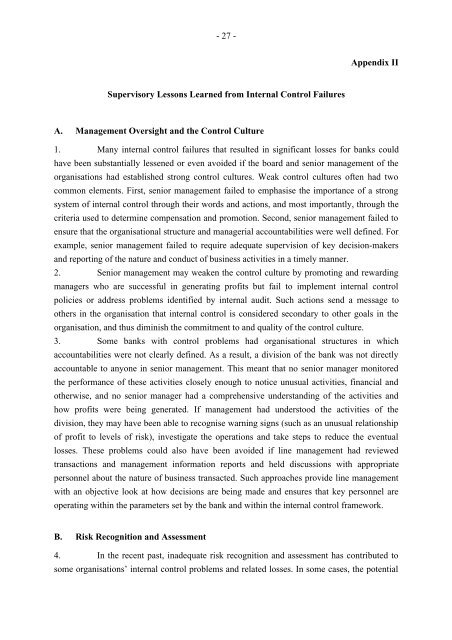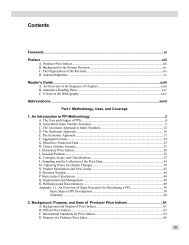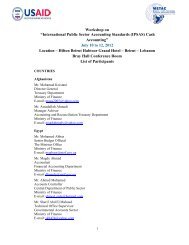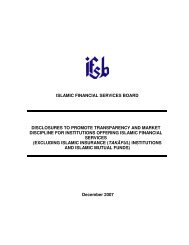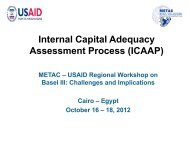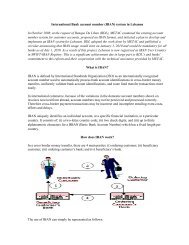Framework for Internal Control Systems in Banking Organisations
Framework for Internal Control Systems in Banking Organisations
Framework for Internal Control Systems in Banking Organisations
Create successful ePaper yourself
Turn your PDF publications into a flip-book with our unique Google optimized e-Paper software.
- 27 -<br />
Appendix II<br />
Supervisory Lessons Learned from <strong>Internal</strong> <strong>Control</strong> Failures<br />
A. Management Oversight and the <strong>Control</strong> Culture<br />
1. Many <strong>in</strong>ternal control failures that resulted <strong>in</strong> significant losses <strong>for</strong> banks could<br />
have been substantially lessened or even avoided if the board and senior management of the<br />
organisations had established strong control cultures. Weak control cultures often had two<br />
common elements. First, senior management failed to emphasise the importance of a strong<br />
system of <strong>in</strong>ternal control through their words and actions, and most importantly, through the<br />
criteria used to determ<strong>in</strong>e compensation and promotion. Second, senior management failed to<br />
ensure that the organisational structure and managerial accountabilities were well def<strong>in</strong>ed. For<br />
example, senior management failed to require adequate supervision of key decision-makers<br />
and report<strong>in</strong>g of the nature and conduct of bus<strong>in</strong>ess activities <strong>in</strong> a timely manner.<br />
2. Senior management may weaken the control culture by promot<strong>in</strong>g and reward<strong>in</strong>g<br />
managers who are successful <strong>in</strong> generat<strong>in</strong>g profits but fail to implement <strong>in</strong>ternal control<br />
policies or address problems identified by <strong>in</strong>ternal audit. Such actions send a message to<br />
others <strong>in</strong> the organisation that <strong>in</strong>ternal control is considered secondary to other goals <strong>in</strong> the<br />
organisation, and thus dim<strong>in</strong>ish the commitment to and quality of the control culture.<br />
3. Some banks with control problems had organisational structures <strong>in</strong> which<br />
accountabilities were not clearly def<strong>in</strong>ed. As a result, a division of the bank was not directly<br />
accountable to anyone <strong>in</strong> senior management. This meant that no senior manager monitored<br />
the per<strong>for</strong>mance of these activities closely enough to notice unusual activities, f<strong>in</strong>ancial and<br />
otherwise, and no senior manager had a comprehensive understand<strong>in</strong>g of the activities and<br />
how profits were be<strong>in</strong>g generated. If management had understood the activities of the<br />
division, they may have been able to recognise warn<strong>in</strong>g signs (such as an unusual relationship<br />
of profit to levels of risk), <strong>in</strong>vestigate the operations and take steps to reduce the eventual<br />
losses. These problems could also have been avoided if l<strong>in</strong>e management had reviewed<br />
transactions and management <strong>in</strong><strong>for</strong>mation reports and held discussions with appropriate<br />
personnel about the nature of bus<strong>in</strong>ess transacted. Such approaches provide l<strong>in</strong>e management<br />
with an objective look at how decisions are be<strong>in</strong>g made and ensures that key personnel are<br />
operat<strong>in</strong>g with<strong>in</strong> the parameters set by the bank and with<strong>in</strong> the <strong>in</strong>ternal control framework.<br />
B. Risk Recognition and Assessment<br />
4. In the recent past, <strong>in</strong>adequate risk recognition and assessment has contributed to<br />
some organisations’ <strong>in</strong>ternal control problems and related losses. In some cases, the potential


